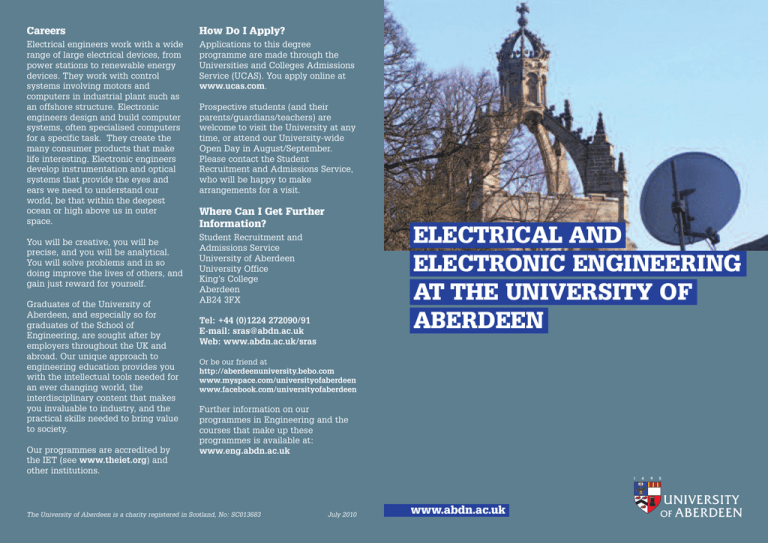electrical and electronic engineering at the university of aberdeen
advertisement

Careers How Do I Apply? Electrical engineers work with a wide range of large electrical devices, from power stations to renewable energy devices. They work with control systems involving motors and computers in industrial plant such as an offshore structure. Electronic engineers design and build computer systems, often specialised computers for a specific task. They create the many consumer products that make life interesting. Electronic engineers develop instrumentation and optical systems that provide the eyes and ears we need to understand our world, be that within the deepest ocean or high above us in outer space. Applications to this degree programme are made through the Universities and Colleges Admissions Service (UCAS). You apply online at www.ucas.com. You will be creative, you will be precise, and you will be analytical. You will solve problems and in so doing improve the lives of others, and gain just reward for yourself. Graduates of the University of Aberdeen, and especially so for graduates of the School of Engineering, are sought after by employers throughout the UK and abroad. Our unique approach to engineering education provides you with the intellectual tools needed for an ever changing world, the interdisciplinary content that makes you invaluable to industry, and the practical skills needed to bring value to society. Our programmes are accredited by the IET (see www.theiet.org) and other institutions. Prospective students (and their parents/guardians/teachers) are welcome to visit the University at any time, or attend our University-wide Open Day in August/September. Please contact the Student Recruitment and Admissions Service, who will be happy to make arrangements for a visit. Where Can I Get Further Information? ELECTRICAL AND ELECTRONIC ENGINEERING AT THE UNIVERSITY OF ABERDEEN Student Recruitment and Admissions Service University of Aberdeen University Office King’s College Aberdeen AB24 3FX Tel: +44 (0)1224 272090/91 E-mail: sras@abdn.ac.uk Web: www.abdn.ac.uk/sras Or be our friend at http://aberdeenuniversity.bebo.com www.myspace.com/universityofaberdeen www.facebook.com/universityofaberdeen Further information on our programmes in Engineering and the courses that make up these programmes is available at: www.eng.abdn.ac.uk The University of Aberdeen is a charity registered in Scotland, No: SC013683 July 2010 www.abdn.ac.uk Why Study Electrical or Electronic Engineering? A range of programmes in Electrical and Electronic engineering are offered at the University of Aberdeen. Electrical and Electronic Engineering is one of the most satisfying subjects that you can study. If your interests are science, technology or mathematics, then consider electrical and electronic engineering as your career. You will use your imagination, your creativity and knowledge to provide society with the complex systems it needs. In your future career you may design the machines that supply our energy needs, or you may design complete computer systems on a silicon chip. Working with photonics you may be instrumenting the ocean depths, or creating stunning electronic displays. Whatever, it will be interesting, it will contribute to society’s needs, and it will be rewarding! Why Study at Aberdeen? The University of Aberdeen has taught science and engineering to those who have gone on to become leaders in the field in Scotland, in the UK and worldwide. We have not just experienced the changes technology has wrought on our society, our researchers and our graduates have been the instigators of much of these changes. We offer you the same standards of excellence in teaching within our research led environment as have been the foundation of so many careers. We ourselves undergo continual change to address the new challenges that arise from societies needs and the opportunities provided by new discoveries. The University of Aberdeen is a worldwide leader in curriculum reform. Our programmes are now more interesting to students, more relevant to employers and better address the needs of our society. Such a process is not carried out once, it is at Aberdeen a continuous process that ensures our leadership and your career prospects. Degree Structure The University of Aberdeen is one of a few institutions offering a general engineering curriculum in the first two years of study, followed by specialist years specific to your chosen career. We offer degrees of both BEng (Bachelor of Engineering) and MEng (Master of Engineering). The BEng is an accredited four years honours programme, while the MEng is a five year programme meeting all educational requirements of a Chartered Engineer. You may defer your choice of professional area until the end of your second year. Degree Programmes: We offer a wide range of programmes enabling you to tailor your degree content to fit your interests and to best further your career: Electrical Engineering with Sustainable Energy Electrical and Electronic Engineering Electrical and Electronic Engineering with European Studies Electronic Engineering with Communications Electrical and Electronic Engineering with Control Electronic and Computer Engineering Electronic and Photonic Engineering Electronic Engineering with Oceanic Instrumentation Mechanical and Electrical Engineering Mechanical and Electrical Engineering with Energy Studies programmes, and some that are specific to your chosen degree programme. You will also carry out a major personal project, and group project work. Subjects Studied: Available subjects are: Engineering Analysis and Methods Control Systems Signals and Systems Analogue Electronics C/C++ Programming Electrical Power Engineering Digital Electronic Systems Communications Engineering Economics Resources and Safety Photonics I Instrumentation Photonics II Advanced Control Engineering Control Engineering Electrical Machines and Drives Computer and Software Engineering Signal Processing Optical Engineering Communications Engineering II VLSI and Digital Architectures Mathematical Optimisation First Year CAD & Communication Electronics Principles Fundamentals of Materials Engineering Mathematics 1 Mechanics Electronics Design Second Year Engineering Mathematics 2 Fluid Mechanics and Thermodynamics Design and Computing Electrical & Mechanical Systems Solids and Structures Electronic Systems Later Years You will follow a range of subjects, some of which are common to all Electrical and Electronic degree





